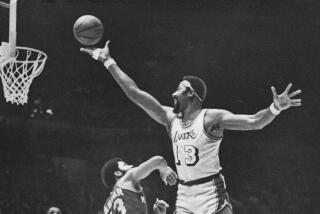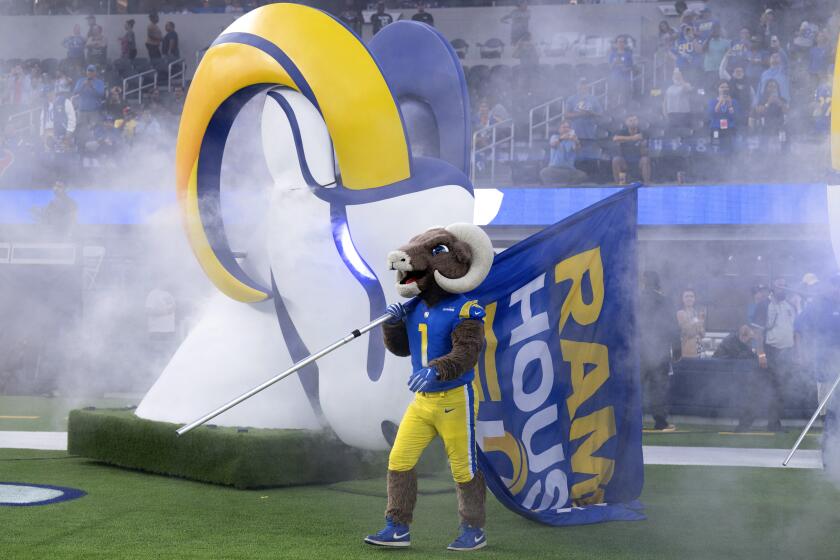Warriors Breathe Easier With Record Still Intact
Winning, a lot of people say, is contagious. So is losing. Ask the Golden State Warriors.
“We’re not as bad as our record,” said Purvis Short, the top player on the National Basketball Assn.’s worst team. “We just can’t seem to win.”
Going into the weekend, the Warriors were winless in 1985.
0-for-15.
They had lost 16 straight games overall, and were eight short of the league record set by the Cleveland Cavaliers in two seasons.
And, for the moment, the Warriors were one loss shy of matching the team mark set 20 years ago. That was what the Warriors were thinking about entering a Saturday night game at home against the New York Knicks.
“Nobody wanted to be remembered for tying the record for number of losses,” Short said. “We didn’t want to be remembered for something like that.”
Short’s fears of going into the Golden State books with “Most Consecutive Losses, 20” did not materialize. The Warriors beat the Knicks, 114-98.
“At least the monkey’s off our backs now,” he said. “We didn’t want to be remembered for tying the club record, so everybody had it on their mind coming in.”
Sooner or later, the streak was bound to end. Assuming that on any given Saturday night any NBA team can beat another, and if that makes any team’s chances of winning any game 50-50, the odds on a team losing 17 straight games would be 131,072-to-1.
So, the Warriors beat the odds. Sort of.
“Two things come to my mind,” Golden State Coach John Bach said after watching his team improve to 11-35 this season. “How fast those 16 losses came and the disbelieving that it could go on.
“When we got to four or five, we couldn’t believe it would go to 10,” he said. “And when it got to 10 . . . “
That was just what Cleveland Cavaliers players went through, starting near the end of the 1981-82 season.
Don Delaney had started the season as the Cavaliers’ coach, but, after losing 11 of 12 games, was replaced by Chuck Daly, who signed a three-year contract. Yet Daly did not work out, and Bill Musselman took over in March.
The year-long stability began to take a heavier and heavier toll, and the Cavaliers lost their last 19 games of the season (the Philadelphia 76ers, in 1973, hold the record for most consecutive losses in one season, 20)
A week before the 1982-83 season, and after dismal preseason play, Tom Nissalke was hired to replace Musselman.
Nissalke signed a one-year contract.
“I wouldn’t have wanted two or three years,” he said when hired. “I want to make sure I’m happy with the situation here and they’re happy with me.”
“This is the toughest challenge I’ve ever had as a coach,” Nissalke said. “The timing is a problem.”
The Cavaliers lost their first five games before snapping their loss streak at 24 with a 132-120 overtime victory at Golden State. Then, the Cavaliers went on to drop their next seven games.
On the grand scale, basketball winning and losing streaks in the 20s pale by comparison.
The Los Angeles Lakers won 33 straight games while rolling to the NBA championship. UCLA went nearly three years while winning 88 straight games. And the Baskin (La.) High School girls’ team went from 1947 to 1953 without a loss--a winning streak of 218 games.
Southwest State (Minn.) lost 46 straight games before winning in late 1973. That losing string tied the mark set by another Division II school, Olivet, through 1961.
The most notable long streak recently was the 29-game winning string of then-No. 1 Georgetown, which fell to St. John’s two weeks ago.
Currently, the longest winning streak in the NBA is 11 games, held by Milwaukee.
And there’s now one long losing streak in progress, too.
In falling to Golden State, the Knicks lost their team-record 15th straight game on the road. That puts them only only 17 losses away from tying the record in that category, set by Baltimore in two seasons in 1953 and 1954.
More to Read
Go beyond the scoreboard
Get the latest on L.A.'s teams in the daily Sports Report newsletter.
You may occasionally receive promotional content from the Los Angeles Times.










